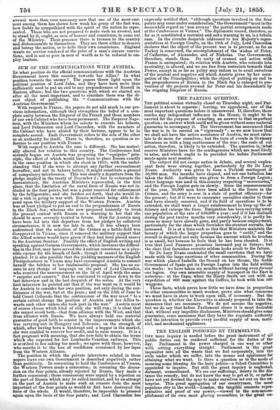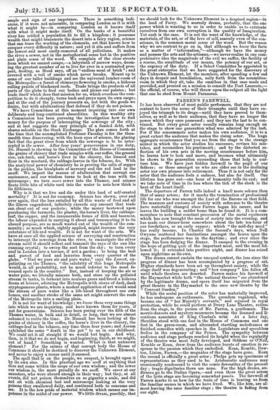THE ENGLISH POISONED BY THEMSELVES.
ONE more inquiry is needed before the great instrument of all public duties can be rendered sufficient for the duties of the day. Parliament is the power charged in one way or other with setting everything straight. Parliament is the great inquisitor into all the wants that we feel corporately, into the evils under which we suffer, into the means and appliances for attaining what we want. Is there a question as to the mode of securing some blessing for the body politic—a Select Committee is appointed to inquire. But still the great inquiry is neglected, dormant, unmentioned. We see our sufferings, descry in the dis- tance the remedy, but do not know the way to get at it, or rather have not yet devised the spur to make ourselves set out on the en- terprise. This great aggregation of our countrymen, the most populous city in the world—London, the tangible concrete repre- sentative and proof of our power,—viewed in the non-accom- plishment of its own most glaring necessities, is the great ex-
ample and sign of our impotence. There is something ludi- crous, if it were not miserable, in comparing Loudon as it is with what it might be—in comparing London as it knows itself with what it might make itself. On the banks of a beautiful river has settled a population fit to fill a kingdom ; it possesses wealth that might transmute the desert into a fairy region, science that can trace the working of the elements, art that knows how to conquer every difficulty in nature; and yet it sits and suffers from the lowest and most easily-removed of all pollutions. It makes the river a sewer, not in the metaphorical sense but in the positive and plain sense of the word. We complain of the close streets from which we cannot escape,—a labyrinth of narrow ways, doom- ing the greatest number of us to live for ever in a contracted pros- pect, feeding, as Hood says, off an "endless meal of brick"; and covered with a veil of smoke which never breaks. Mount up to some of our taller buildings and see the universal lumber-room of the Metropolis—a forest of chimneys flowering in smoke, a hideous rolling prairie of blackened roofs. Trade brings the products of all parts of the globe to feed our bodies and please our palates ; but trade itself which does that mission for us, which overdoes the com- petition to do it cheaply, turns back and preys upon its own cargo ; and at the end of the Journey presents us, not with the goods we desire, but with adulterations that defraud if they do not poison. We have Committees at this moment inquiring into our own deliberate and long-continued absurdities. In this wealthy city a Commission has been pursuing the investigation how to find money for the purpose of intercepting the sewerage of the city ; and at last suggests the easy principle of a funded debt, with shares saleable on the Stock Exchange. The plan comes forth at the time that the accomplished Professor Faraday is for the thou- sandth time discovering, with the keen eyes of science, the glaring fact that the great river from which the sewerage is to be inter- cepted is the sewer. After four years' perseverance in one duty, Dr. Hassell is showing to the Committee of the House of Commons the grains of chicory that trade mingles with our coffee, the ground rice, oak-bark, and horse's liver in the chicory, the linseed and flour in the mustard, the cabbage-leaves in the tobacco, &c. With the analytical power of chemistry he is proving the salts of copper in the pickles, the bisulphate of mercury and the red lead in the snuff. We import the masses of adulteration that corrupt our sustenance, and our wisdom turns to look at the tons with the microscope ; we turn more sewer into the Thames, and science floats little bits of white card into the water to note how thick is its filthiness.
Why is it that we live and die under this load of self-created mortality ? It is not for economy. Science has shown, over and over again, that the loss entailed by all this waste of food and all the illness engendered, infinitely exceeds any amount that trade can cheat out of our pockets ; while the money bestowed upon purchasing the turmeric, the plaster, the horse's liver, the cabbage- leaf, the copper, and the innumerable forms of filth and baseness, the labour expended in carrying it about and transmuting it to its absurd purpose, are so much wasted out of the wealth of the com- munity; so much which, rightly applied, might increase the very substance of life and wealth. It is not for want of the arts. We have at once all the applied science of surveying and construction to intercept the sewerage from the river, to emancipate the silver stream until it should reflect and transmit the rays of the sun like running crystal ; to sweep the soot from the sky; to turn every roof in London into a terrace, if not a garden ; to bring the best and purest of food and luxuries from every quarter of the globe. "Had we pure air and pure water," says the Lancet, ex- patiating on the Thames, "the salubrity of this huge Metropolis would, in all probability, not be much inferior to the most fa- voured spots in the country." But, instead of keeping the air or water pure, we literally manure both, and store up the polluted stream in tanks, to ferment into noxious gases and breed a hideous fauna at leisure, adorning the Metropolis with stores of dark, dank cryptogamous plants, where a modest application of art would send the stream of pure water like a life-blood throughout our own homes, and another stroke of the same art might convert the roofs of the Metropolis into a smiling plain. It is not for want of knowledge ; we know these very same things into which we are inquiring, and have known them for years, if not for generatips. Science has been poring over the filth of Thames water, m, bulk and in detail, so long, that we are almost ashamed to recite-the time. Dr. Hassell has been looking at the grains of chicory in the coffee, the horse's liver in the chicory, the cabbage-leaf in the tobacco, any time these four years ; and Accum exhibited the same " death in the pot " to us in our childhood. We could set it all straight if we would but begin. And why, then, is it that we do not begin, and beginning, finish, as we might, out of hand ? Something is wanted. What is that unknown element P For the crimes of that corrupt body the House of Commons it should be destined to discover the Unknown Element, and never to enjoy a recess until it succeed. The spell that is on the people, we suspect, is brought upon it by its own sins. In this practical age we scoff at anything that does not come within the scope of our own wisdom ; and the lower our wisdom is, the more proudly do we scoff We sneer at our ancestors, who were absurd enough in their way ; but they, at all events, did not poison themselves on so gigantic a scale, and did not sit with chemical test and microscope looking at the very poisons they swallowed daily, and continued both to consume and see. It is the low pride of material wisdom which causes our im- potence in the midst of our power. We little dream, possibly, that
we should look for the Unknown Element in a despised region—in the land of Peery. We scarcely dream, probably, that the one power which is wanting to us in order to enable us to extricate ourselves from our own corruption is the quality of Imagination. Yet such is the case. It is not the want of the knowledge, of the materials, of the art, or of the love of self, scarcely even of the con- science, in the common moral sense of the word. But the reason why we are content to go on is, that although we know the facts as a matter of "information,"—although we have the money and possess the arts and the artisans,—we never realize in one com- prehensive idea the magnitude of the evil we suffer, the facility of a rescue, the amplitude of our means, the potency of our art, or the urgency of the duty. If a Select Committee be appointed to the great enterprise that we have suggested for the discovery of the Unknown Element, let the members, after spending a few sad days in despair and humiliation, sally forth from the committee- room in which they sit, take the omnibus in that case made and provided, and proceed on a mission to consult the Poet Laureate,— the official, of course, who will throw upon the subject all the light that can be shed from Mount Parnassus.



























 Previous page
Previous page